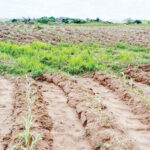A university don from the Faculty of Agriculture in the Bayero University, Kano (BUK), Dr Jazuli Muhammad Bichi, has urged farmers in the country to avoid planting varieties of grains that will exceed 90 days in their farms without harvest.
The lecturer stated this in Bagwai Local Government of Kano during the disbursement of free maize, groundnut and soya beans improved seeds to farmers by the Billital Maroobe Pastoralist Association of Nigeria (BILMPAN).
Buhari welcomes first ship at Lekki Deep Sea Port
AKTH gets N300m equipment to reduce neo-natal, maternal mortality
Dr Jazuli said that due to climate change in the world, the rainy season had become shorter than it used to be, and that every variety that would not produce within 90 days would not be harvested because rain is expected to stop before that period of time.
According to him, farmers in rural areas should adopt modern systems of farming, which include embracing improved varieties, otherwise they may end up with nothing from their farms, like the last wet season.
“Some farmers still use outdated seeds and not embracing changes. Some of us are still using seeds inherited from our grandparents, which is not proper. There are changes in farming and there are new varieties that produce more than the old ones and within a short period of time.
“So we urge you to take good advantage of these varieties and make sure they are planted with the guidance of professionals. The maize will be harvested in 82 days while soya beans takes only 70 days to be harvested,” he said.
On his part, the president of the association, Alhaji Ali Muhammad Rimindako, said they decided to embark on the gesture considering the shortage of rain experienced by farmers last year and the effect of COVID-19 that is still affecting the vulnerable, especially in the rural areas.
He said as their organisation comprised of pastoralists and farmers, they also recently empowered pastoralists with animals, feeds and other needed materials.
“As you can see, fertiliser is very expensive now in the market and difficult for smallholder farmers, so there is the need for varieties that will produce within a shortage period,” he said.
One of the beneficiaries, Danladi Yahaya, assured that they would use the seed and spread the information for others to benefit. H appreciated the association for the support.
 Join Daily Trust WhatsApp Community For Quick Access To News and Happenings Around You.
Join Daily Trust WhatsApp Community For Quick Access To News and Happenings Around You.


